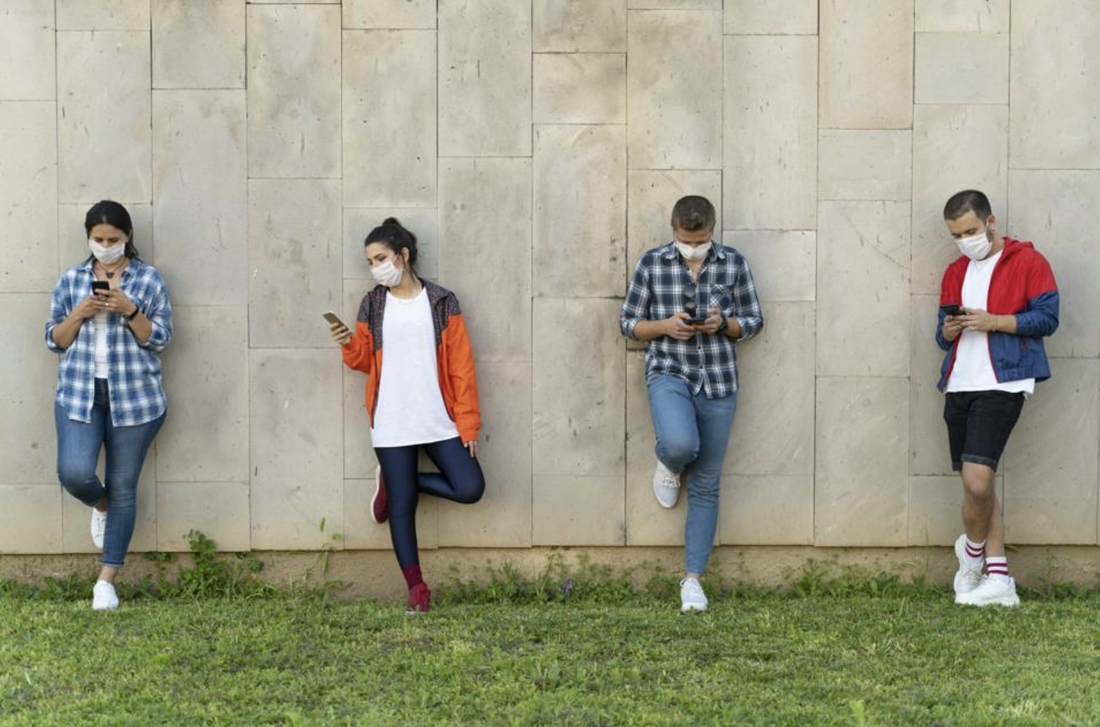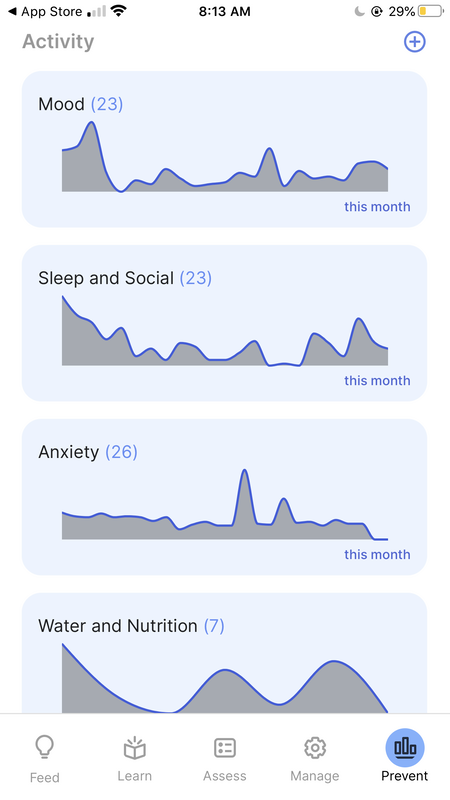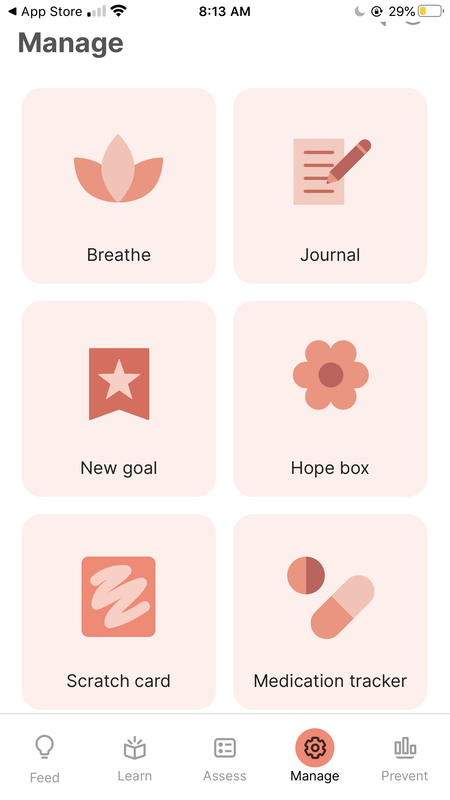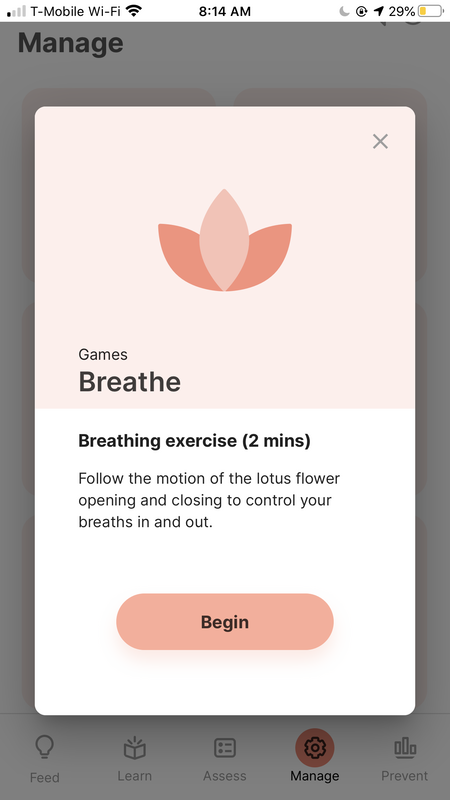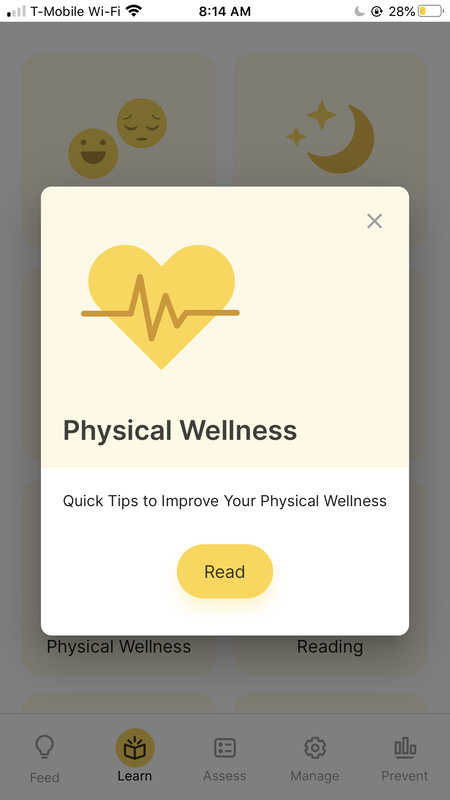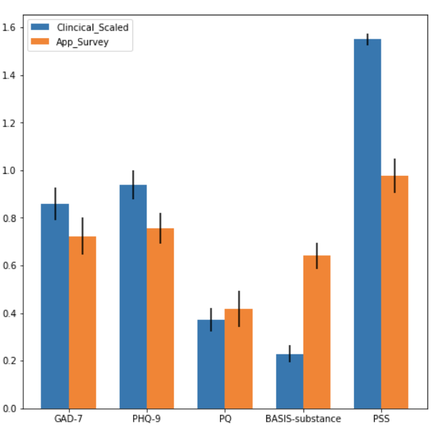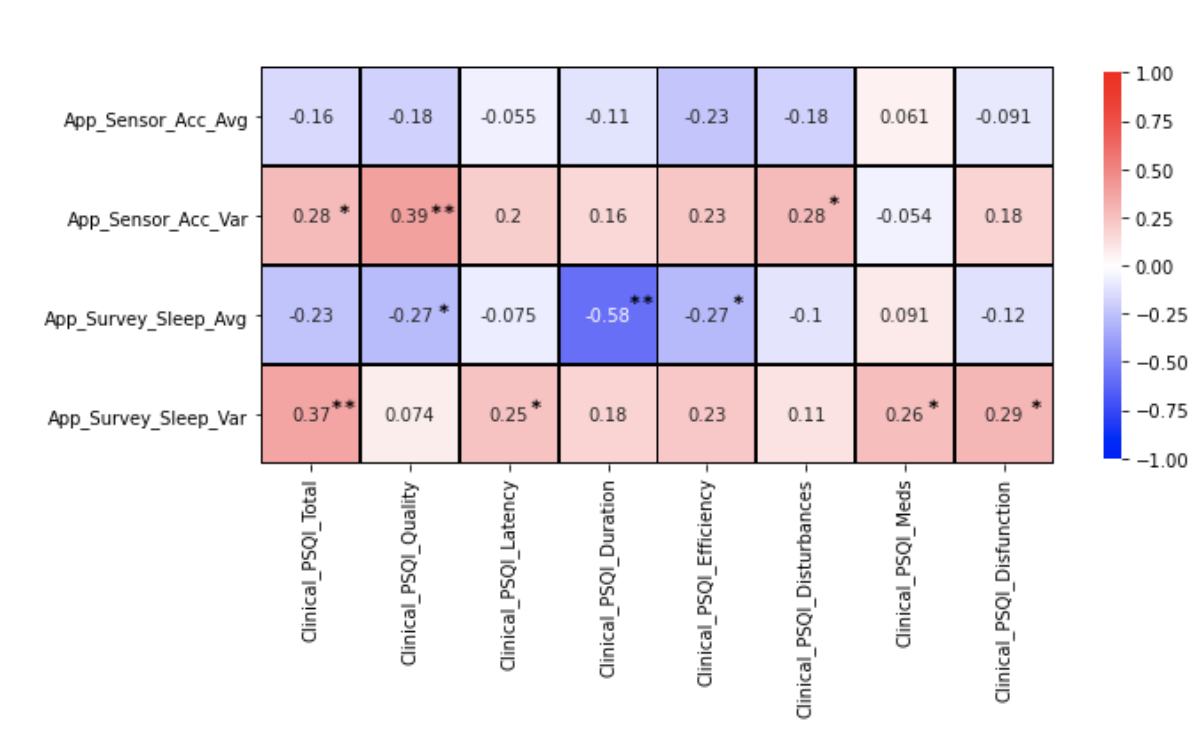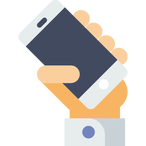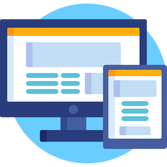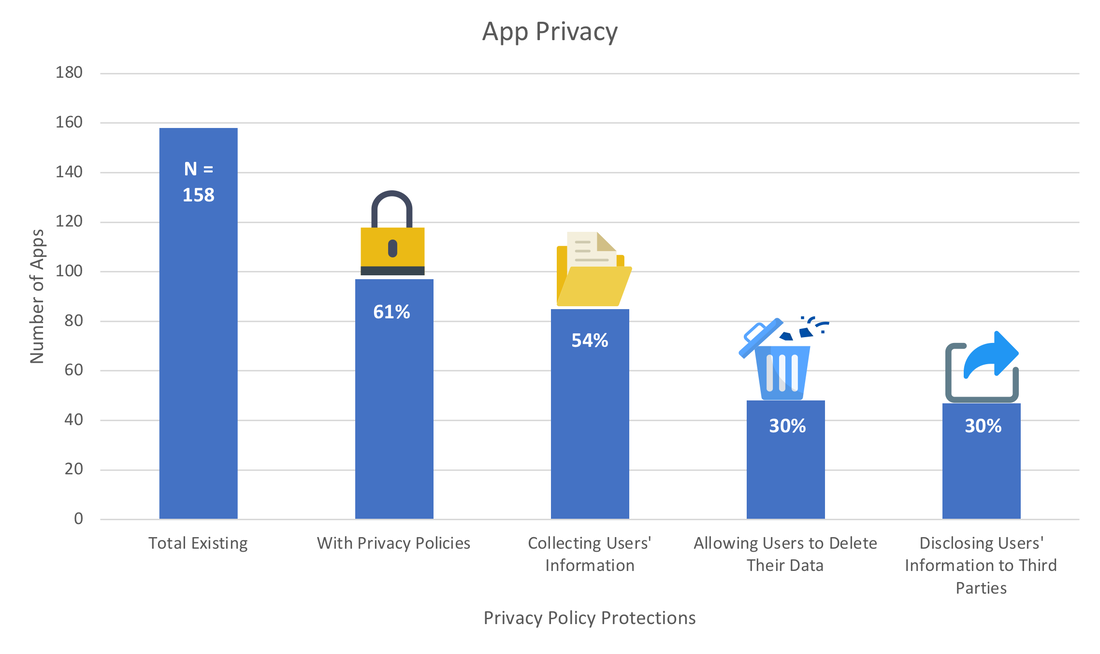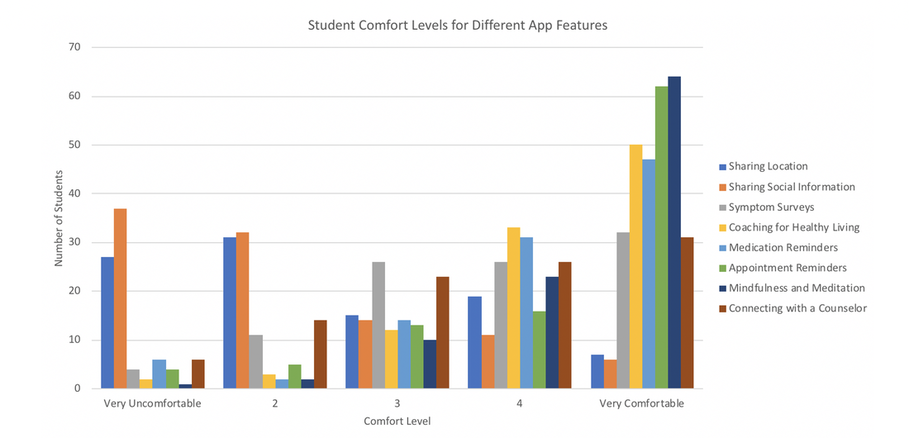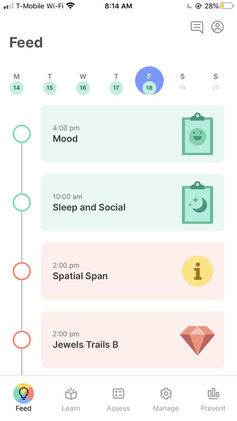|
Colleges are seeing an unprecedented rise in student mental health needs in recent years. This trend has only been heightened by the COVID-19 pandemic. CDC data from June 2020 revealed that adults in the age range of college students (18-24) are experiencing a significant worsening in mental health during the pandemic. As students adjust to increasingly remote learning and activities, the need for scalable digital mental health solutions for students is greater than ever.
Our team has been studying what digital resources are available to college students now and how these students can be better served by a better mental health app. Our solution, the mindLAMP app is shaped by students' wants and needs for a mental health app. |
Our work in the news:
|
Our college mental health work was recently featured in Forbes as the college mental health crisis grows and school continue to direct the surge of students coming to the counseling center towards digital solutions such as websites and apps.
|
mindLAMP app
The mindLAMP app is a mental health management platform that aligns with the wants and needs of college students and administrators alike. The app is built off of students' suggestions and updated following a trial with 100 college students. The improved mindLAMP is now being implemented with 1000 college students around the country.
The mindLAMP app consists of four pages, spelling the acronym LAMP.
The mindLAMP app consists of four pages, spelling the acronym LAMP.
- First, in the Learn section, users can access helpful mental health resources and tips.
- In the next section, Assess, users can complete surveys. These surveys are customized to address the specific needs of the user.
- The third page, Manage, has activities and techniques to manage symptoms such as a mindful breathing activity, a journaling feature, and more.
- Finally, the Prevent page shows all of the data from the surveys the user has been completing. On this page, the user can communicate with their clinician or researcher as well as see their own survey responses.
For students:
We conducted focus groups with 100 college students to understand what they look for in a mental health app. Students revealed that they had some criteria for mental health apps. Notably, they wanted:
Melcher, J., Camacho, E., Lagan, S., Torous, J.: College Student Engagement with Mental Health Apps: Analysis of Barriers to Sustained Use. Journal of American College Health 2020.
- Low cost or free apps
- A modern and east to navigate user interface
- Data and privacy protections for their sensitive mental health information
- Credible research-backed tools
- The ability to customize an app to suit their own needs
Melcher, J., Camacho, E., Lagan, S., Torous, J.: College Student Engagement with Mental Health Apps: Analysis of Barriers to Sustained Use. Journal of American College Health 2020.
For colleges:
Colleges can use the mindLAMP app provide a scalable and safe resource to students, whether remote or on-campus as well as learn about how students are doing and identify problem areas. Our study of 100 college students using the mindLAMP app revealed significant correlations between students' behaviors or activities and their mental health.
Use cases for LAMP on college campuses
|
mindLAMP as a self-help resource:
|
|
|
mindLAMP for students working with clinicians:
Our study of 100 college students using the mindLAMP app revealed that in addition to population-level relationships between behavior and mental health, individuals showed strong personal patterns. This information in the hands of a clinician can help identify how a patient's behavior is impacting their mental health.
mindLAMP has been implemented in our team's own Digital Clinic where patients see a clinician once a week and use the mindLAMP app to complete surveys and cognitive games between sessions. See our research on the Digital Clinic: Rodriguez-Villa, E., Rauseo-Ricupero, N., Camacho, E., et al. The digital clinic: Implementing technology and augmenting care for mental health. General Hospital Psychiatry 2020. |
For everyone:
Privacy Protections
|
Our analysis of 158 apps offered to students by college mental health centers found that many apps offered had some serious privacy concerns. Only 61% of these apps had a privacy policy. 54% of the apps stated they collected users information, but only 30% of the apps allowed for users to delete their data. Finally, 30% of the apps explicitly stated that they disclosed user information to third parties. Students are wary of apps that share and sell data. Ensuring that apps keep data secure means that students will feel more comfortable using this tool.
The mindLAMP app is not a commercial app and is not affiliated with any company. Data is used for research purposes only. |
Data Transparency
|
Students are willing to allow for data collection through their mental health apps for certain reasons. However, lack of trust in apps or feeling suspicious of how apps used personal data often led students to delete apps.
On the mindLAMP app, students can see all of their own data and know exactly what their colleges can or cannot see. |
I think it should be made clear exactly how the app is using the data --I’m okay with it as long as the app is transparent. - college student |
Customizability
|
Traditional digital mental health platforms tend to be rigid and offer one singular service (i.e. mood tracking or meditation or journaling). The mindLAMP app allows for flexibility. Students have full control over the surveys and activities they see. At the same time, administrators can add tasks and surveys to each student's daily feed (i.e. A COVID-19 symptom survey may be added)
How do I know that will help me specifically? I know it helps a ton of people but for me it’s different. How do I know that’ll help me? - college student |
Founded in Research
Today, anyone can create an app and put it out on the app marketplace as a resource. For this reason, students expressed skepticism about some mental health apps and preferred apps from credible sources or with references to research. Only 25% of apps suggested by college mental health centers had any published peer-reviewed research. The mindLAMP app has been used in clinical and research domains, specifically for college students.
More about college mental health:
Melcher, J., Torous, J.: Smartphone Apps for College Mental Health: A Concern for Privacy and Quality of Current Offerings. Psychiatric Services 2020. See Article
Melcher, J., Camacho, E., Lagan, S., Torous, J.: College Student Engagement with Mental Health Apps: Analysis of Barriers to Sustained Use. Journal of American College Health 2020. See Article
Melcher, J., Hays, R., Torous, J.: Digital Phenotyping for Mental Health of College Students: A Clinical Review. Evidence-Based Mental Health 2020. See Article
Melcher, J., Lavoie, J., Hays, R., et al. Digital Phenotyping of Student Mental Health During COVID-19: an Observational Study of 100 College Students. Journal of American College Health. 2021. See Article.
Melcher, J., Camacho, E., Lagan, S., Torous, J.: College Student Engagement with Mental Health Apps: Analysis of Barriers to Sustained Use. Journal of American College Health 2020. See Article
Melcher, J., Hays, R., Torous, J.: Digital Phenotyping for Mental Health of College Students: A Clinical Review. Evidence-Based Mental Health 2020. See Article
Melcher, J., Lavoie, J., Hays, R., et al. Digital Phenotyping of Student Mental Health During COVID-19: an Observational Study of 100 College Students. Journal of American College Health. 2021. See Article.
More about mindLAMP:
Rodriguez-Villa, E., Rauseo-Ricupero, N., Camacho, E., et al. The digital clinic: Implementing technology and augmenting care for mental health. General Hospital Psychiatry 2020.
Torous, J., Vaidyam, A. Multiple uses of app instead of using multiple apps - a case for rethinking the digital health technology toolbox. Epidemiology and Psychiatric Sciences 2020.
Torous, J., Vaidyam, A. Multiple uses of app instead of using multiple apps - a case for rethinking the digital health technology toolbox. Epidemiology and Psychiatric Sciences 2020.


